In the modern workplace, coffee is an absolute lifesaver, a corporate angel (and yes, it wears a suit), dishing out lovely little cups of energy around the office and helping you out when you’re feeling sluggish from the night before.
And you’re not alone in enjoying the many benefits of coffee; as Reuters points out, the average American enjoys 3.1 cups of coffee on a daily basis.
What’s more, Voltaire, the famous French writer, and philosopher of the enlightenment period was a huge proponent of a good cup o’ joe as well. In fact, it is said that he used to drink up to a whopping 40 cups of coffee a day!
Today, giving up coffee in the workplace comes off as just illogical to most professionals. After all, its productivity-enhancing effects are second to none, right?
Not really, as it turns out. Because while it may have worked for Voltaire, data shows that drinking coffee might be taking a bigger toll on your productivity than you think.
But, in order to understand how quitting coffee can improve your productivity; first, we need to delve further into what caffeine actually is and how it works in the first place.
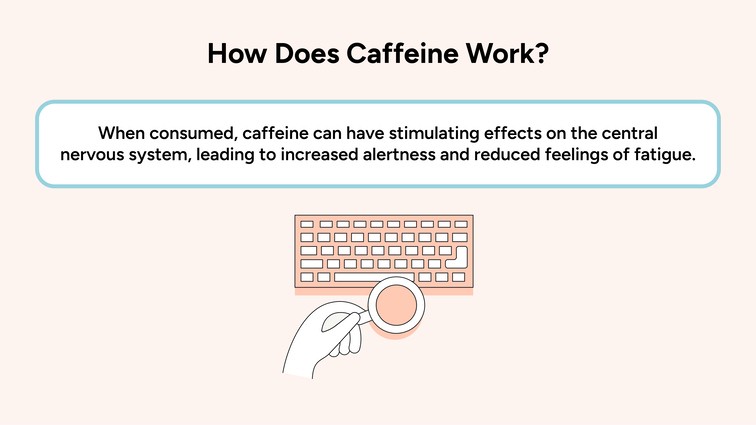
How Does Caffeine Work?
When we talk about the detrimental effects of coffee on your productivity, we are, of course, talking more specifically about caffeine, the stimulant within coffee responsible for most of its perceivable effects. Caffeine is a drug, and like any other drug, it can have both positive and negative effects on your productivity.
But coffee is not the only drink with caffeine in it. In fact, most of the popular beverages we consume regularly have caffeine in them.
However, what puts quitting coffee to boost productivity in the spotlight is the sheer volume of within coffee compared to some of the other popular beverages like coke and tea. A regular cup of coffee packs twice as much caffeine as the same amount of tea and a whopping four times more caffeine than in a cup of coke!
When consumed, the caffeine in these beverages acts very quickly. As a result, most people will immediately feel an extra feeling of alertness. And according to the American Academy of Sleep Medicine, it will stay in your system for over 6-10 hours.
Caffeine makes you more sensitive to dopamine, a chemical messenger that plays a role in how we feel happiness. So yes, even if it doesn’t deliver happiness to your door, coffee does at least increase your capacity for happiness.
What’s more, caffeine blocks a particular molecule in your body called Adenosine. It is a sleep-inducing molecule that tells you when it might be time to sleep and rest. The combination of these two functions brings about alertness, increased energy, and a feeling of enhanced focus.
Is It Safe To Quit Caffeine Cold Turkey?
For the majority of individuals, quitting caffeine abruptly can be harmless, although it may cause painful withdrawal symptoms. Headaches, exhaustion, impatience, and problems focusing are a few of these symptoms. You can also be feeling mentally drained. Individuals differ in terms of these symptoms' length and severity. Caffeine consumption should normally be gradually reduced to lessen the severity of withdrawal symptoms.
However, it is advised to speak with a healthcare provider before stopping coffee suddenly if you have any pre-existing health disorders or concerns. They can offer tailored guidance depending on your unique situation. Everybody may react differently to giving up coffee, so it's important to pay attention to your body and make any necessary modifications.
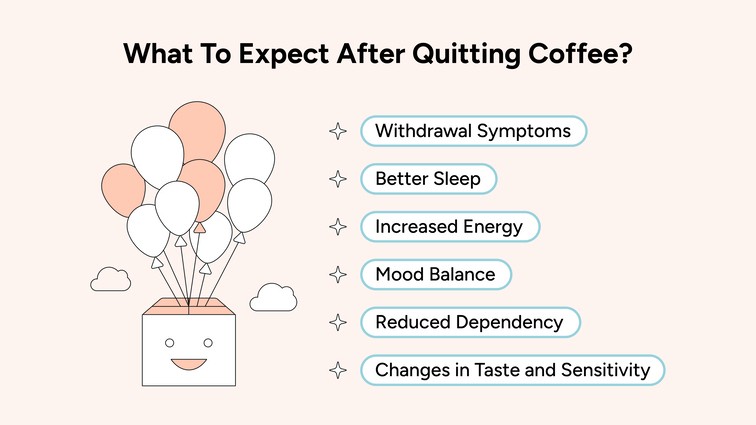
What To Expect After Quitting Coffee?
You might anticipate both short-term and long-term impacts after giving up coffee. Here are some frequent reports of common experiences:
Withdrawal Symptoms: Caffeine withdrawal symptoms, which might include headaches, lethargy, irritability, difficulty concentrating, and mood swings, may at first appear. Usually beginning within a few days after quitting, these symptoms get better with time.
Better Sleep: Caffeine, a stimulant found in coffee, can reduce the quality of sleep. Many people who stop smoking report better sleep after doing so. You could discover that it's simpler to fall asleep, have fewer interruptions during the night, and wake up feeling more rested.
Increased Energy: It's ironic that giving up coffee might result in more energy throughout the day. Although it gives you a brief energy boost, caffeine may also lead to energy dips and dependence. You could have more constant and lasting energy after your body gets used to not needing coffee.
Mood Balance: Caffeine can affect how you feel, and it might occasionally make you jittery, anxious, or irritable. For some people, giving up coffee might result in a more stable mood and a decrease in anxiety or restlessness. It's crucial to remember that everyone will react differently to caffeine withdrawal.
Reduced Dependency: Giving up coffee might help you stop the cycle of reliance since it can become a habit. You could discover that you eventually don't need coffee to perform or feel awake. This recent freedom from coffee might seem liberating and give you more control over your energy levels.
Reduced Dependency: Dehydration and digestive changes are possible due to coffee's diuretic properties. As you cut back on caffeine after quitting, your hydration levels can become better. Furthermore, some people report better digestion and a decrease in digestive problems that may have been brought on by coffee intake.
Changes in Taste and Sensitivity: Coffee might alter your taste preferences and level of flavor sensitivity. You can discover that your taste preferences have changed after giving up. As your taste receptors retrain without the effect of coffee, food and beverages may taste different or more intensely.
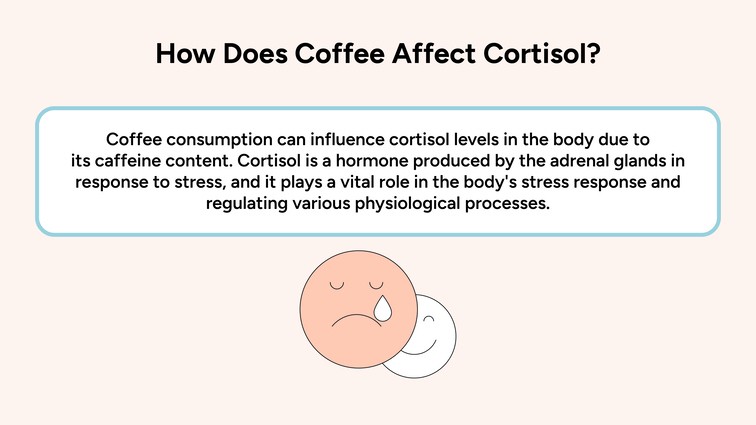
How Does Coffee Affect Cortisol?
Consuming coffee may have an impact on the body's cortisol levels. The principal active ingredient in coffee, caffeine, promotes the adrenal glands' production of cortisol. Coffee can cause a brief rise in cortisol levels, especially if you drink it frequently or right before night.
The body's natural stress reaction causes cortisol to surge, which can temporarily improve energy and alertness. It's crucial to remember that how much coffee a person consumes, their sensitivity to caffeine, and their general health may all affect how much of an effect coffee has on cortisol levels in their bodies.
Regular and excessive coffee intake may cause persistent high cortisol levels, which might be harmful to one's health and wellness. To keep the body's cortisol response healthy, it's crucial to achieve a balance between individual tolerance levels and coffee intake.
How Does Quitting Coffee Improve Productivity?
In a word, yes. Quitting coffee will improve your productivity. Especially in the long run, the many detrimental effects of caffeine will begin to outweigh its benefits. By quitting coffee, you can; improve your sleep, avoid caffeine slumps, work on underlying issues related to energy, and eliminate the nasty withdrawal symptoms.
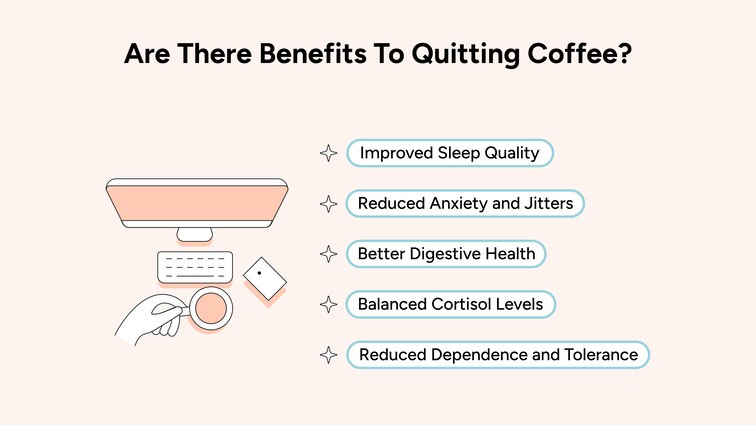
Are There Benefits To Quitting Coffee?
Some people may find it difficult to give up coffee, a popular caffeinated beverage used on a global scale. Many people now drink coffee in the mornings because it provides an instant energy boost. Giving up this cherished beverage might, however, have some advantages.
Giving up coffee may be beneficial for your physical and mental health, whether it's through lessening your need on caffeine, getting better sleep, or having more consistent energy levels throughout the day. This article will examine the possible advantages of giving up coffee and explain how it can have a good impact on a number of elements of health and daily living.
So if you're interested in learning about the possible benefits of a life without coffee, keep reading to find out what they could be.
No Coffee Means Better Sleep
As we know, sleep is the ultimate productivity tool. What the wheel, fire, and agriculture are to civilization is what sleep is to productivity; without it, you’re in deep trouble.
There is a truckload of benefits sleeping provides to your mind and body. And many of these are directly linked to productivity. Some of these benefits are:
Increased energy levels
Better memory
Improved communicative functions
A more balanced mood
Reduced stress
Overall increase in cognitive functions
Without an adequate amount of sleep, you simply don’t have a foundation to build on for productivity. As a matter of fact, Fort Healthcare states that sleeping for only 1.5 hours less can decrease your alertness by as much as %32!
As we mentioned above, the caffeine inside coffee blocks your Adenosine molecule, which is pivotal for your brain to register when it’s time to rest. And because caffeine has such a long half-life, an average coffee drinker will almost definitely struggle or at least lose a portion of their sleeping period.
This will have a hugely detrimental impact on your cognitive functions and completely ruin your mood for the next day.
Caffeine is also a diuretic. It increases your urine production, which can cause dehydration and headaches, as well as other side effects such as dizziness, fatigue, and dry mouth.
In addition to this, caffeine can also cause anxiety and panic attacks, which will make it harder for you to concentrate.
Quitting coffee is very different from quitting other addictive stimulants because the many benefits of caffeine are very vivid and immediate, while the detrimental effects are harder to uncover.
But when you consider the hours of sleep you may sacrifice for the comparatively meagre benefits of coffee, you may come to see that quitting coffee for better sleep will be much more beneficial in the long term.
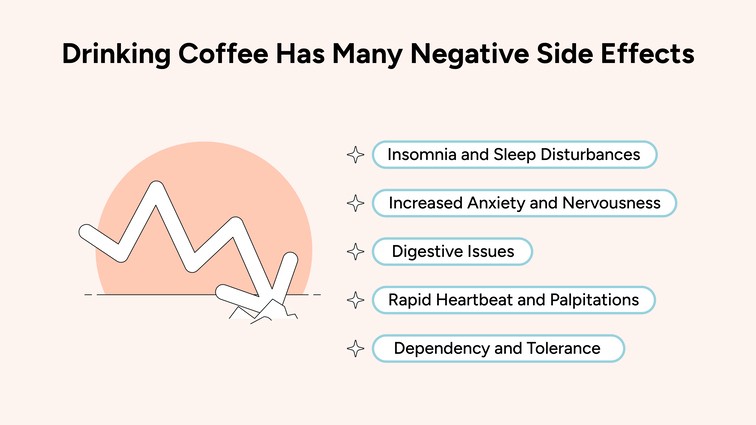
Drinking Coffee Has Many Negative Side Effects
With time, the detrimental effects of the caffeine inside coffee begin to rear their heads more, especially in middle-aged or older people. There are many side effects outside the domain of productivity that caffeine poses, but to keep on track, we’ll be talking specifically about those that directly affect your productivity.
At Before Sunset, we often touch on just how important being focused and avoiding distractions can be hugely important for productivity. In fact, some of our champion time tracking methods, like The 25-minute Timer Technique, are built solely around retaining your focus. But prolonged caffeine use can do the exact opposite and hurt your focus instead.
Dizziness, headaches, and anxiety are just some side effects of caffeine that are especially prevalent in older people and those who regularly consume higher volumes of caffeine. These have the potential to really hurt your performance at work. Just imagine yourself drinking a cup of coffee before an important presentation and having to deal with headaches throughout it.
The caffeine crash is also a real thing. Once your body gets used to having the boost of energy from caffeine, it starts producing less and less adenosine, which is what keeps you awake. This is the reason why you have to keep increasing your caffeine intake to get the same effect.
Rather than relying solely on coffee to boost your productivity, why not head over to our 14 Easy Time Management Tips to Apply guide to learn more about how time management can skyrocket your productivity? Besides, there’s nothing better than using technology to improve your productivity rather than the juice of some crushed-up magic bean!
Caffeine Slumps Kill Productivity
A caffeine slump, also known as a caffeine crash, is a state of absolute inability to work a few hours after drinking coffee while in a tired state. Symptoms can include headaches, dizziness, loss of focus, irritability, and nausea, which we can all agree are definitely not what you expect from a cup of coffee.
If you wake up early and feel tired by the time you arrive at work, and reach for the coffee machine as soon as you go through the door, you might wanna take into consideration the very present possibility of having a caffeine slump in the afternoon, once the effects of the coffee have dissipated.
How can you tell if it's a caffeine slump or just tiredness? It is difficult to distinguish the two, and most people don't even realize that they are experiencing a caffeine slump until they stop drinking coffee altogether and realize that they feel much better.
One of the best ways to tell if you're experiencing a caffeine slump is to track your energy levels throughout the day, by making a note of how you're feeling every time you drink coffee.
You will then be able to tell when the effects begin to dissipate and your energy levels drop, which will give you a clear indication that you need to drink more coffee.
Caffeine slumps massively decrease not only your productivity but also your mental well-being. For regular coffee drinkers, here are some tips you can use to avoid caffeine slumps:
Don’t drink coffee on an empty stomach
Regulate your sleep hours to reduce fatigue
Drink plenty of water
Spread out drinking coffee throughout the day
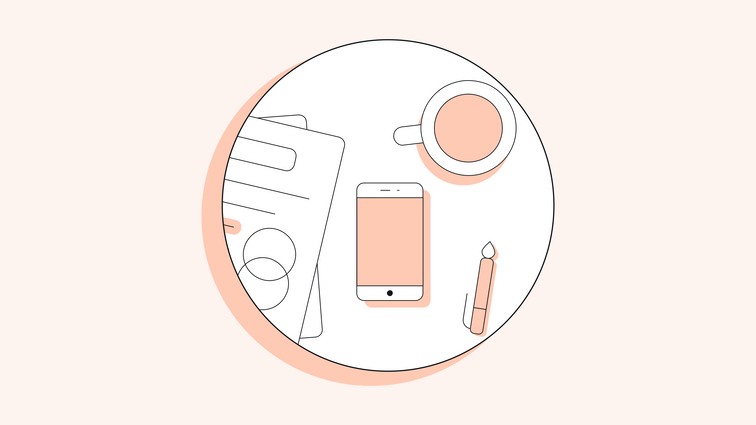
A Caffeine-Free Life
Coffee is great because coffee makes you feel energetic and focused!
But why do you even need coffee to feel like that in the first place?
For many people considering quitting drinking coffee, the ultimate aim is to quit coffee without having to sacrifice its many benefits to productivity. But it turns out that coffee itself prevents you from delving deeper and uncovering the reasons behind your decreased energy levels.
To put it simply, coffee works like a panacea. With coffee around, you don’t feel the need to ask yourself why you wake up in the morning feeling like you’ve been hit by an 18-wheeler. But if you take the time to solve all the issues that negatively impact your base energy levels, you won’t be needing coffee in the first place!
And yes, it may sound a bit farfetched, but by no means is it impossible. Increasing your base energy levels can be as simple as going to bed an hour early every night or even changing your pillows or mattress!
How Long Does It Take To Detox From Coffee?
Coffee detoxification differs from person to person and is influenced by a number of variables, including the quantity and frequency of coffee use, a person's metabolism, and general health. Although there isn't a set length of time for coffee detox, the symptoms of caffeine withdrawal usually reach their height within the first few days and then start to fade over the course of one to two weeks.
Following is a basic timeline of things to anticipate when on a coffee detox:
First 24 hours: You may begin to suffer symptoms including headaches, weariness, irritability, and difficulties concentrating within hours of your last cup of coffee. These typical withdrawal symptoms exist.
Days 1-2: During this time, the early withdrawal symptoms may become more severe. You could still have headaches, weariness, mood changes, and coffee cravings. Additionally, some people could experience stomach problems and physical discomfort.
Days 4–7: Although you could still feel the aftereffects, the withdrawal symptoms often start to lessen in intensity. Your energy levels could start to level out, and the headaches ought to lessen in frequency. However, some people could still feel worn out and angry.
Days 8 and up: At this stage, the majority of patients begin to feel markedly better, with fewer symptoms and a greater sense of wellbeing. Though individual experiences might differ, it's crucial to keep in mind that some people may need more time to completely detox from coffee.
Does Coffee Contribute To Belly Fat?
There is continuing study into the link between coffee drinking and belly fat, but the results are not yet fully clear. Coffee alone, meanwhile, does not directly contribute to belly obesity.
In reality, several components of coffee, such caffeine and chlorogenic acid, have been linked to possible advantages for metabolism. It has been demonstrated that caffeine momentarily increases metabolism and fat burning. When coffee is eaten without additional sweets or high-fat additions, it is also a low-calorie beverage. However, consuming sweetened or high-calorie coffee beverages in excess might result in weight gain and perhaps the development of belly fat.
Coffee's total effect on belly fat is influenced by a person's general dietary habits, way of life, and calorie intake. Maintaining a healthy weight and body composition can be aided by a balanced diet, frequent exercise, and cautious coffee drinking.
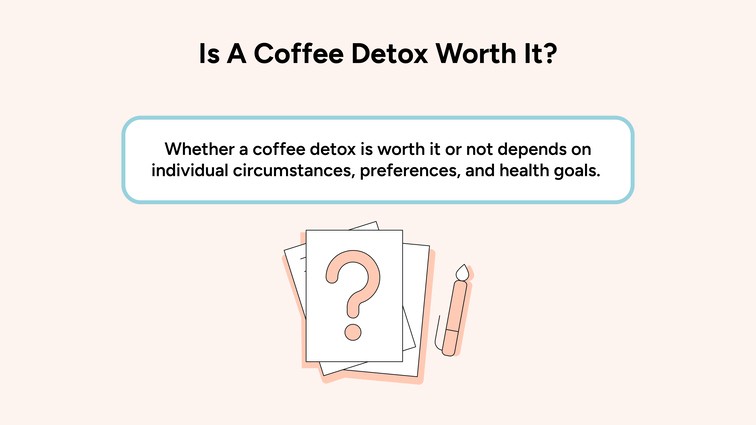
Is A Coffee Detox Worth It?
The value of a coffee detox depends on the circumstances and objectives of each person. For those who desire to cut back on their caffeine intake, overcome caffeine dependence, or address certain health issues connected to coffee drinking, a coffee detox may be helpful.
Improved sleep, steady energy levels, less dependence on caffeine, and possibly alleviation from caffeine-related adverse effects including jitters or anxiety are some advantages of a coffee detox.
It's crucial to remember that a coffee detox may cause brief withdrawal symptoms, some of which might be painful. It's crucial to pay attention to your body, gradually cut back on coffee if necessary, and make sure you're still eating a balanced diet and being well-hydrated. A coffee detox may be appropriate for you based on your unique health objectives after consulting with a healthcare practitioner.
The choice to go in a coffee detox should ultimately be dependent on personal choices, requirements, and the advantages evaluated against any potential drawbacks.
What Does A Caffeine Headache Feel Like?
Caffeine headaches, commonly referred to as caffeine withdrawal headaches, are a typical side effect of rapidly reducing or quitting caffeine use. A throbbing or pulsing pain, frequently centered in the temples or the back of the head, is the common symptom. The headache may be mild to severe in severity and continue for several hours or even several days.
There may also be other symptoms including weariness, irritation, trouble concentrating, and in some cases even nausea. The quick lack of caffeine is thought to trigger changes in blood flow and the constriction of blood vessels in the brain, which results in caffeine headaches. Although they can be rather uncomfortable, they are often only short-lived and go away as the body gets used to the new, lower caffeine levels or when the caffeine is restored.
Does Quitting Caffeine Increase Testosterone?
Further study is needed to determine the association between coffee withdrawal and testosterone levels. While some research indicate that coffee may temporarily lower testosterone levels, it is unknown how giving up caffeine may affect testosterone levels.
It's crucial to remember that a variety of factors, including genetics, age, general health, lifestyle decisions, and other hormonal interactions, can affect testosterone levels. testosterone levels are unlikely to be significantly and directly
impacted by coffee withdrawal alone. It is recommended that you speak with a healthcare provider if you have any questions regarding your testosterone levels or hormonal balance so they can offer you individualized advice based on your unique situation.
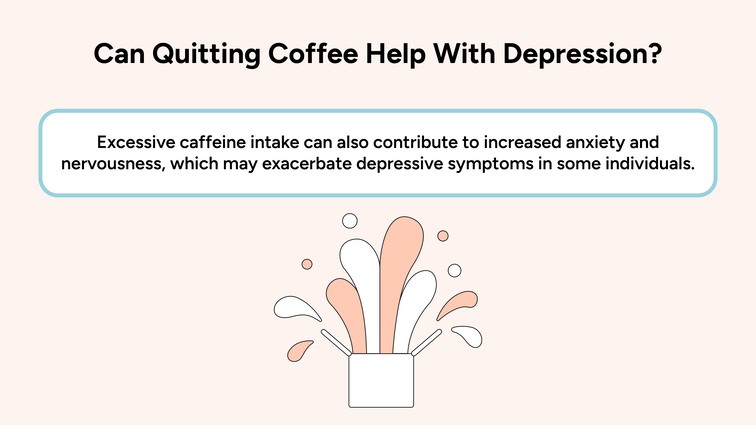
Can Quitting Coffee Help With Depression?
Reducing or eliminating caffeine intake might potentially have some favorable impacts on mental health, yet quitting coffee alone may not be a full approach for managing or treating depression. A stimulant, caffeine can momentarily improve mood and energy levels.
However, consuming too much caffeine or being sensitive to it can lead to increased anxiety, agitation, and disturbed sleep patterns, all of which can have a bad effect on mental health. Reduced caffeine consumption might be advantageous for those with underlying depression as part of a more comprehensive, all-encompassing strategy for managing mental health.
It's crucial to remember that depression is a complicated disorder, and that successful treatment frequently requires obtaining professional assistance, including counseling and/or medication. The optimal course of action for controlling depression can be determined with the help of a healthcare practitioner after consultation.
Do You Know What Else Increases Productivity? BeforeSunset
In this review, we talked about how quitting coffee can improve your productivity, but there are so many other tactics you can use to get more work done in the same period of time. At Before Sunset, we strive to help you do just that.
Our extensive time-tracking AI helps you monitor and analyze how much time you and your team spend every day on specific tasks.
By knowing what activities consume a large amount of your time, you will see what you need to spend less time on to be able to shift your attention to the more essential tasks of the day. Our dynamic AI will even analyze your time consumption and give you feedback on what you can do to use your time more wisely and send your productivity through the roof!
